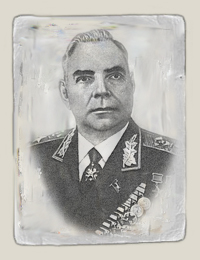Nikolay Krylov
 29.4.1903 - 9.2.1972 29.4.1903 - 9.2.1972Nikolay Krylov was Commander of the 5th Army, Colonel-General. He was born on April 29, 1903 in the village of Vishnevoe, today Tamalinsky district of Penza region in a servant’s family. Russian. In 1919 he graduated from an external secondary school in Arkadak, Saratov region and volunteered for the Red Army. In October 1920, he graduated from the infantry and machine gun courses for Red commanders, in September 1928 - the highest postgraduate courses “Shot.” In 1919-1922 participated in the battles on the South, the Caucasus, the Transcaucasus and the Far East fronts, occupying posts of commander of the rifle platoon, company and battalion. Wounded twice. In 1929 he took part in battles against white Chinese during the conflict on the Chinese Eastern Railway. Before the war he served as chief of staff of fortified area in the Odessa Military District. At the beginning of the war he was chief of operations, from August 1941 - Chief of Staff of Maritime Army, from September 1942 - Chief of Staff of the 62nd Army, from April 1943 - Chief of Staff of the 8th Guards Army, from May 1943 - Commander of the 3rd Army Reserve, from July 1943 - Commander of the 21st Army, from October 1943 to October 1944 and from December 1944 - Commander of the 5th Army. Fought on the South, the North Caucasus, Stalingrad, Don, Southwest, West, the 3rd Belorussian and the 1st Far Eastern Fronts. Participated in the defense of Odessa, Sebastopol, in the Battle of Stalingrad, liberation of Smolensk region, Belarus, Lithuania, and defeating the enemy in East Prussia and Manchuria. Was seriously wounded in January 1942 in Sebastopol. Nikolay Krylov was awarded the honorary title of Hero of the Soviet Union, the Order of Lenin and the Gold Star medal (№ 7111) on April 19, 1945 for his personal courage and leadership during the army troops of the Belorussian offensive operation. The second Gold Star medal (№ 4309), Colonel-General Nikolay Krylov received on September 8, 1945 for the destruction of a large group of Japanese troops in Manchuria, and for his personal bravery and courage. After the war he commanded the 15th Army. In 1945-1947 he was deputy commander of the Maritime Military District, from January 1947 to April 1953 - Commander of the Far Eastern Military District, 1953-1956 - First Deputy Commander of the Far Eastern Military District. From January 1956 to November 1957 - Commander of the Ural Military District, from November 1957 to October 1960 - Commander of the Leningrad Military District, from October 1960 to March 1963 - Commander of the Moscow Military District. In 1963-1972 he was commander of the Strategic Missile Forces (SMF) - Deputy Minister of Defence of the USSR. On September 18, 1953 he was promoted to General of the Army, and on April 29, 1962 – to Marshal of the Soviet Union. A member of the Supreme Soviet of the USSR, a member of the CPSU Central Committee. Lived in Moscow. Died on February 9, 1972. The urn containing his ashes was installed in the Kremlin wall. He was awarded three Orders of Lenin (1942, 1945, 1963), the Order of the October Revolution (1968), Four Orders of the Red Banner (1942, 1943, 1944, 1950), the 1st Class Order of Suvorov, (1944), the 1st Class Order of Kutuzov (1943), medals “For defense of Odessa” and “For defense of Sebastopol”, “For defense of Stalingrad”, “For capture of Koenigsberg”, “For Victory over Germany in the Great Patriotic War of 1941 – 1945”, “For Victory over Japan”, and five commemorative medals, as well as many foreign orders and medals. A bronze bust was installed in the village of Vishnevoe in 1951. |




